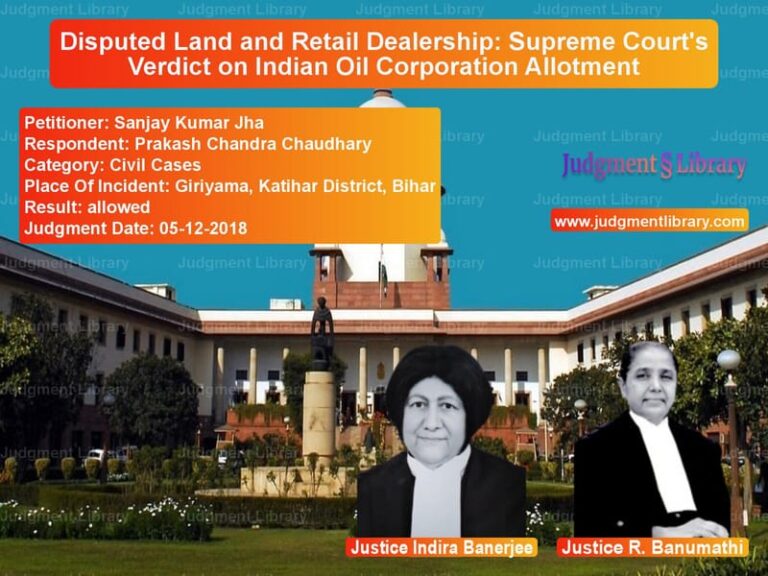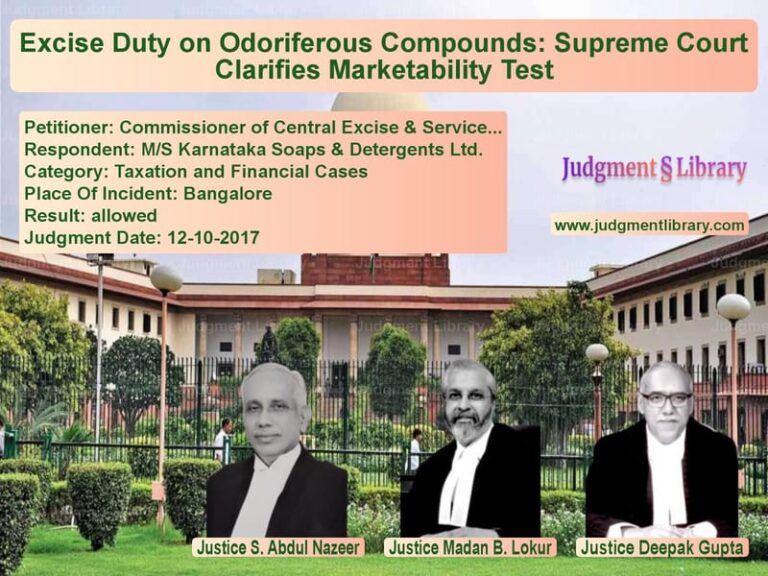Madhya Pradesh Police Constable Appointment: Supreme Court Upholds Rejection Due to Criminal Case
The case of The State of Madhya Pradesh & Ors. v. Bunty revolves around the rejection of a police constable candidate on the grounds of his past involvement in a criminal case. The Supreme Court, in its judgment dated March 14, 2019, upheld the decision of the Madhya Pradesh Police Screening Committee to deny the appointment, emphasizing the importance of integrity in law enforcement.
This judgment serves as an important precedent regarding the appointment of individuals with past criminal records in disciplined forces like the police.
Case Background
The respondent, Bunty, had applied for the post of constable in the Madhya Pradesh Police in 2013. He successfully cleared the recruitment test and other selection criteria, including the physical endurance test and medical examination.
However, during the police verification process, it was found that Bunty had been involved in a criminal case under Sections 392 (robbery) and 411 (dishonestly receiving stolen property) of the Indian Penal Code. Though he was acquitted on January 7, 2015, the acquittal was based on the benefit of the doubt rather than a clean exoneration.
On this basis, the Screening Committee of the Madhya Pradesh Police deemed him unfit for appointment. Aggrieved by this decision, Bunty filed a writ petition before the High Court of Madhya Pradesh, Indore Bench.
High Court Proceedings
A Single Judge Bench of the High Court upheld the decision of the Screening Committee, relying on the Supreme Court’s ruling in Commissioner of Police, New Delhi v. Mehar Singh (2013) 7 SCC 685. The court ruled that since Bunty’s acquittal was not a clean one, his appointment as a police constable could be denied.
Bunty then appealed before a Division Bench of the High Court, which reversed the Single Judge’s decision, holding that since he had been acquitted, he was entitled to appointment.
The Madhya Pradesh government then challenged this ruling in the Supreme Court.
Petitioner’s Arguments
The Madhya Pradesh government, represented by its counsel, contended:
- The Screening Committee had objectively assessed Bunty’s involvement in the criminal case and rightly deemed him unfit for appointment.
- The acquittal in the criminal case was based on the benefit of doubt and not a clear exoneration.
- Being a disciplined force, the police must ensure that only individuals with impeccable character and integrity are inducted.
- The High Court’s Division Bench erred in assuming that an acquittal automatically grants the right to public employment.
Respondent’s Arguments
Bunty’s counsel countered with the following arguments:
- His acquittal in the criminal case meant that the allegations against him were unproven.
- The Screening Committee acted arbitrarily by denying him employment despite the acquittal.
- The High Court’s Division Bench correctly ruled that once acquitted, a candidate cannot be denied employment based on past allegations.
Supreme Court’s Observations and Ruling
The Supreme Court ruled in favor of the Madhya Pradesh government and set aside the Division Bench’s judgment. The Court made the following key observations:
“The respondent had participated in the selection process in the year 2013, at that time the said criminal case was pending consideration, and he has been acquitted subsequently. However, the acquittal was not a clean one.”
The Court emphasized that mere acquittal does not entitle a candidate to public employment:
“Appointment could not have followed as a matter of course as observed by the Division Bench of the High Court.”
Regarding the nature of the offense, the Court observed:
“Considering the nature of the allegation in the case, it was a case of impersonation as a police officer and thereby committing the offense under Sections 392 and 411 of the IPC. It was a case of the serious kind, which involved moral turpitude.”
The Court cited Mehar Singh’s case, which held:
“The police force is a disciplined force. A candidate wishing to join the police force must be a person of utmost rectitude. A person having criminal antecedents will not fit in this category, even if he is acquitted.”
The Court further referred to its ruling in Avtar Singh v. Union of India (2016) 8 SCC 471:
“If acquittal had already been recorded in a case involving moral turpitude on technical ground, or it is not a case of clean acquittal, or benefit of reasonable doubt has been given, the employer may consider all relevant facts available as to antecedents.”
Based on these precedents, the Supreme Court ruled:
“The perception formed by the Screening Committee that he was unfit to be inducted in the disciplined police force was appropriate. The decision of the Scrutiny Committee could not be said to be such which warranted judicial interference.”
Consequently, the Court:
- Set aside the Division Bench’s order.
- Upheld the decision of the Screening Committee.
- Confirmed that Bunty was rightly denied appointment as a constable.
Conclusion
This judgment upholds the principle that a mere acquittal does not confer an automatic right to public employment. The key takeaways from this ruling are:
- Police forces require candidates with impeccable character, and past criminal allegations can be a valid ground for rejection.
- An acquittal based on the benefit of the doubt is not the same as a clean exoneration.
- The decision of the Screening Committee, when made objectively and without arbitrariness, should not be interfered with by courts.
- The judiciary must balance an individual’s right to employment with the need to maintain integrity in public service.
By rejecting the High Court’s Division Bench ruling, the Supreme Court reinforced the importance of discipline and credibility in the police force, ensuring that candidates with questionable antecedents do not enter law enforcement.
Petitioner Name: The State of Madhya Pradesh & Ors..Respondent Name: Bunty.Judgment By: Justice Arun Mishra, Justice Navin Sinha.Place Of Incident: Madhya Pradesh.Judgment Date: 14-03-2019.
Don’t miss out on the full details! Download the complete judgment in PDF format below and gain valuable insights instantly!
Download Judgment: The State of Madhya vs Bunty Supreme Court of India Judgment Dated 14-03-2019.pdf
Direct Downlaod Judgment: Direct downlaod this Judgment
See all petitions in Recruitment Policies
See all petitions in Public Sector Employees
See all petitions in Employment Disputes
See all petitions in Judgment by Arun Mishra
See all petitions in Judgment by Navin Sinha
See all petitions in allowed
See all petitions in Modified
See all petitions in supreme court of India judgments March 2019
See all petitions in 2019 judgments
See all posts in Service Matters Category
See all allowed petitions in Service Matters Category
See all Dismissed petitions in Service Matters Category
See all partially allowed petitions in Service Matters Category







